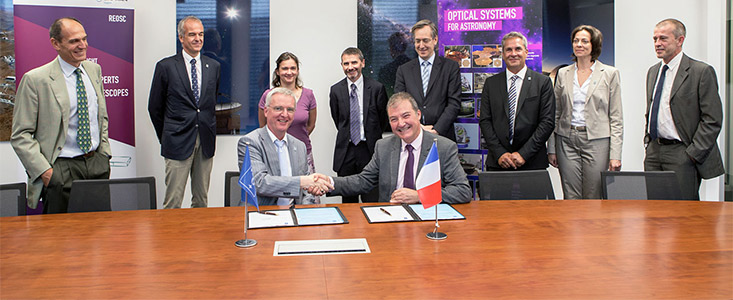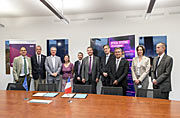Annuncio
L'ESO firma il contratto per gli specchi sottili deformabili dell'E-ELT
08 Luglio 2015
L'ESO ha firmato un contratto con la compagnia Francese di ottica Reosc, una sussidiaria della Sagem, del gruppo Safran, per la costuzione degli specchi sottili deformabili che costituiranno il quarto specchio (M4) dell'European Extremely Large Telescope (E-ELT) Questi specchi saranno montati e allocati nell'unità di ottica adattiva (ann15045) per formare la più grande unità di ottica adattiva mai assemblata prima d'ora.
Il contratto è stato firmato dai rappresentanti della Reosc e dell'ESO durante una cerimonia al quartier generale dell'ESO, l'8 Luglio 2015.
L'unità dello specchio deformabile M4 forma una parte chiave dell'E-ELT. Con 2,4 metri di diametro, sarà costituito da sei sottili segmenti di specchi, ognuno dei quali con uno spessore di soli 1,95 millimetri e fatti da vetro-ceramica. Ognuno costituisce uno dei sei petali, larghi 60 gradi che formano lo specchio circolare segmentato M4.
La SCHOTT consegnerà i pezzi di ceramica alla Reosc e la Reosc li lavorerà e luciderà gli specchi sottili. Il consorzio AdOptica in Italia — ADS International e Microgate, partner di INAF (Istituto Nazionale di Astrofisica) come subcontrattori — assemblerà gli specchi e costruirà l'intera unità di supporto (ann15045).
La sfida della prototipazione di questo specchio va avanti da diversi anni. La Reosc ha prodotto il primo specchio piatto e sottile per il programma E-ELT già nel 2008. Questo specchio di 1,95 millimetri di spessore e 1 metro di diametro fu tagliato in due petali e usato come prototipo dimostrativo [1]. Nel 2010, la Reosc ha prodotto con successo uno specchio sottile di 2,7 metri fatto di vetro borofloat e tagliato in segmenti.
Nel 2011, la Reosc ha poi consegnato il primo guscio sottile per lo specchio deformabile del VLT (Very Large Telescope). Questo specchio asferico (ann12015) fu rivestito ed integrato nell'unità di supporto e poi testato all'ESO già dalla fine del 2012 (potw1307a). Un secondo specchio a guscio sottile per lo specchio secondario deformabile del VLT (DSM) fu consegnato alla fine del 2013 (ann14010), e sarà testato all'ESO nei primi mesi del 2016.
La Reosc produrrà 12 specchi sottili per l'M4 dell'E-ELT, programmando di produrre i primi sei specchi entro cinque anni e di completare la produzione dei dodici specchi entro il 2023.
Note
[1] Il petalo installato sul prototipo dimostrativo è mostrato in questa immagine.
Links
- Firmato il contratto per la progettazione finale e la costruzione per l'unità adattiva delllo specchio più grande del mondo
- ESO assegna il contratto per lo studio di progetto dello specchio adattivo per l'E-ELT
- E-ELT M4 (Microgate)
- An Expanded View of the Universe – Science with the European Extremely Large Telescope
- Progetto ottico dell'E-ELT
- Note sull'optomeccanica dell'E-ELT (M. Cayrel)
- Specifiche e progetto dell'unità adattiva M4 dell'E-ELT M4 (E. Vernet et al.)
Contatti
Elise Vernet
ESO, Adaptive Optics Department (Instrumentation)
Garching bei München, Germany
Tel: +49 89 320 06 322
Fax: +49 89 320 2362
Email: evernet@eso.org
Lars Lindberg Christensen
Head of ESO ePOD
Garching bei München, Germany
Tel: +49 89 3200 6761
Cell: +49 173 3872 621
Email: lars@eso.org
Riguardo all'annuncio
| Identificazione: | ann15055 |
Our use of Cookies
We use cookies that are essential for accessing our websites and using our services. We also use cookies to analyse, measure and improve our websites’ performance, to enable content sharing via social media and to display media content hosted on third-party platforms.
ESO Cookies Policy
The European Organisation for Astronomical Research in the Southern Hemisphere (ESO) is the pre-eminent intergovernmental science and technology organisation in astronomy. It carries out an ambitious programme focused on the design, construction and operation of powerful ground-based observing facilities for astronomy.
This Cookies Policy is intended to provide clarity by outlining the cookies used on the ESO public websites, their functions, the options you have for controlling them, and the ways you can contact us for additional details.
What are cookies?
Cookies are small pieces of data stored on your device by websites you visit. They serve various purposes, such as remembering login credentials and preferences and enhance your browsing experience.
Categories of cookies we use
Essential cookies (always active): These cookies are strictly necessary for the proper functioning of our website. Without these cookies, the website cannot operate correctly, and certain services, such as logging in or accessing secure areas, may not be available; because they are essential for the website’s operation, they cannot be disabled.
Functional Cookies: These cookies enhance your browsing experience by enabling additional features and personalization, such as remembering your preferences and settings. While not strictly necessary for the website to function, they improve usability and convenience; these cookies are only placed if you provide your consent.
Analytics cookies: These cookies collect information about how visitors interact with our website, such as which pages are visited most often and how users navigate the site. This data helps us improve website performance, optimize content, and enhance the user experience; these cookies are only placed if you provide your consent. We use the following analytics cookies.
Matomo Cookies:
This website uses Matomo (formerly Piwik), an open source software which enables the statistical analysis of website visits. Matomo uses cookies (text files) which are saved on your computer and which allow us to analyze how you use our website. The website user information generated by the cookies will only be saved on the servers of our IT Department. We use this information to analyze www.eso.org visits and to prepare reports on website activities. These data will not be disclosed to third parties.
On behalf of ESO, Matomo will use this information for the purpose of evaluating your use of the website, compiling reports on website activity and providing other services relating to website activity and internet usage.
Matomo cookies settings:
Additional Third-party cookies on ESO websites: some of our pages display content from external providers, e.g. YouTube.
Such third-party services are outside of ESO control and may, at any time, change their terms of service, use of cookies, etc.
YouTube: Some videos on the ESO website are embedded from ESO’s official YouTube channel. We have enabled YouTube’s privacy-enhanced mode, meaning that no cookies are set unless the user actively clicks on the video to play it. Additionally, in this mode, YouTube does not store any personally identifiable cookie data for embedded video playbacks. For more details, please refer to YouTube’s embedding videos information page.
Cookies can also be classified based on the following elements.
Regarding the domain, there are:
- First-party cookies, set by the website you are currently visiting. They are stored by the same domain that you are browsing and are used to enhance your experience on that site;
- Third-party cookies, set by a domain other than the one you are currently visiting.
As for their duration, cookies can be:
- Browser-session cookies, which are deleted when the user closes the browser;
- Stored cookies, which stay on the user's device for a predetermined period of time.
How to manage cookies
Cookie settings: You can modify your cookie choices for the ESO webpages at any time by clicking on the link Cookie settings at the bottom of any page.
In your browser: If you wish to delete cookies or instruct your browser to delete or block cookies by default, please visit the help pages of your browser:
Please be aware that if you delete or decline cookies, certain functionalities of our website may be not be available and your browsing experience may be affected.
You can set most browsers to prevent any cookies being placed on your device, but you may then have to manually adjust some preferences every time you visit a site/page. And some services and functionalities may not work properly at all (e.g. profile logging-in, shop check out).
Updates to the ESO Cookies Policy
The ESO Cookies Policy may be subject to future updates, which will be made available on this page.
Additional information
For any queries related to cookies, please contact: pdprATesoDOTorg.
As ESO public webpages are managed by our Department of Communication, your questions will be dealt with the support of the said Department.


